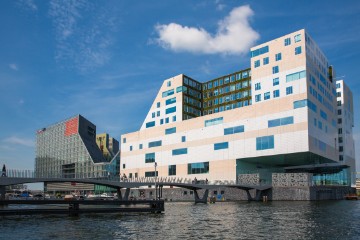
As a construction law firm in the Netherlands, we are proud that the Netherlands is part of one of Europe’s most successful and competitive legal systems. The Dutch law system is not only renowned for its robustness, but also offers an abundance of opportunities for professionals like myself who specialize in legal matters related to the construction industry in the Netherlands. In this article, our Dutch solicitor for construction law, Remko Roosjen, will discuss some of the key tasks that come with being a construction lawyer in the Netherlands, as well as provide insight into why working in this field can be so rewarding.
The first task facing any professional within the Dutch legal system is understanding the complexities associated with local legislation and regulations. As a construction law firm in the Netherlands, it is essential to have an extensive knowledge of all relevant laws and regulations pertaining to your particular sector – from zoning ordinances to building codes. Additionally, having experience navigating complex contractual agreements between parties is also important if you wish to succeed in this field.
Finally, being able to offer clients sound advice on their respective rights and obligations when dealing with pertinent issues such as taxation or contract disputes are just two more aspects that make up a good construction lawyer here in the Netherlands. With these skills combined, you are sure to find success operating within this unique legal environment.
Overview Of Construction Law In The Netherlands
Construction law in the Netherlands is a complex and intricate legal system. It weaves together myriad of components, from contracts to building permits, all with the aim of ensuring that construction projects are completed safely and efficiently. As a construction law firm in the Netherlands, we understand how daunting this process can be for those who are unfamiliar with it — which is why we’re here to provide an overview of what you need to know about construction law in the Netherlands.
The cornerstone of any construction project in the Netherlands is its contract. This document forms an agreement between two or more parties regarding their respective roles and responsibilities during the project’s life-cycle. In addition to outlining each party’s duties, these contracts also include provisions related to deadlines, payments, liability insurance, dispute resolution and other contractual matters pertaining to a particular construction project. Depending on the size and scope of the undertaking, different types of contracts may apply — such as subcontracting agreements or joint venture agreements — but they all must adhere to Dutch laws governing construction contracts.
Finally, no matter how comprehensive your contract might be, there are certain regulatory requirements imposed by Dutch authorities that must be met before a project can begin. These include obtaining necessary permits (such as environmental permits) and meeting safety standards set forth by local government entities. Additionally, when constructing large-scale developments or renovating existing buildings in urban areas, developers must obtain special real estate licenses from municipal governments prior to starting work on site.
As we transition into discussing Dutch real estate law and building permits next, it’s important to remember that navigating through Holland’s complex network of regulations requires expert help from experienced professionals like myself. As a construction law firm in the Netherlands, we gladly be of assistance to guide you.
Dutch Real Estate Law And Building Permits
Real estate law in the Netherlands is highly regulated. It’s important to understand the Dutch legal framework when engaging in any kind of property transaction or construction project. To obtain building permits, an applicant must comply with relevant regulations set by local authorities and adhere to the Building Code of the Netherlands (Bouwbesluit).
In addition, applicants need to be aware that real estate transactions are subject to transfer taxes, as prescribed by national laws. For example, if a developer wants to acquire an existing building or construct a new one on their own land, they will have to pay transfer tax upon completion of the purchase agreement. Another thing that developers should take into consideration is zoning restrictions imposed by regional governments, which can affect the scope of their projects significantly.
As these rules can be quite complex for someone who’s unfamiliar with them, it’s advisable to seek advice from an experienced construction lawyer before proceeding with any venture related to Dutch real estate law and building permits. A qualified professional will provide guidance throughout all stages of your development process – from obtaining permits up until final inspection – ensuring every step complies with applicable statutes and regulations.
The role of a construction law firm in the Netherlands includes providing legal counsel regarding various aspects associated with acquiring land rights and completing projects successfully while adhering to all government-mandated standards.
The Role Of A Construction law firm In The Netherlands
The role of a construction law firm in the Netherlands is to provide legal services and advice to both individuals and businesses. A Dutch construction lawyer will be able to help with all aspects of building law related to the Dutch market, including contract negotiation, dispute resolution and compliance with regulations. They can also provide advice on construction contracts and offer legal representation should any disputes occur.
Construction lawyers in the Netherlands have an important job when it comes to helping their clients understand the complexities of building law. For example, they must advise their clients about contractual obligations, agreements between parties involved in a project as well as ensure that proper procedure has been followed during negotiations or if there are any conflicts which need resolving. Additionally, they are required to keep up-to-date with changes in legislation so as to provide accurate guidance for those seeking their assistance.
Furthermore, construction lawyers are often called upon to represent clients who may find themselves facing litigation due to alleged breaches in terms of agreement. This means they must be prepared to battle complex cases involving multiple stakeholders and technical evidence – such as blueprints or documents – while ensuring that their client’s interests remain protected throughout proceedings. As such, one must possess strong analytical skills along with excellent communication abilities and knowledge of relevant laws before becoming a successful construction lawyer in the Netherlands.
With this understanding of what is expected from a professional working within this field, it is clear why it is essential for anyone dealing with issues related to building law netherlands seek expert advice from experienced attorneys offering comprehensive construction legal services netherlands. Moving forward then we now turn our attention towards examining various contractual obligations, agreements and dispute resolution methods associated with these matters.
Contractual Obligations, Agreements And Dispute Resolution
It’s a jungle out there when it comes to understanding contractual obligations, agreements and dispute resolution in the construction law industry of The Netherlands. To get through this thicket requires an experienced guide who knows their way around the Dutch legal landscape. As construction lawyers with years of experience in the field, we are well-prepared to navigate our clients through each step of forming contracts and resolving disputes.
When working on a construction project within The Netherlands, all parties must have an agreement that outlines their respective roles and responsibilities as they relate to the project at hand. A contract should also include plans for how liability will be divided should any issues arise during or after completion of the project. Our team can provide expert guidance while crafting these agreements so that everyone involved is protected from potential risks associated with the job.
Disputes between construction workers, companies, or other stakeholders may occur despite having an agreement in place. We understand that addressing these conflicts quickly is paramount in order to avoid further complications down the road. That’s why our firm offers efficient dispute resolution services such as negotiation and mediation tailored specifically for The Netherlands’ unique laws regarding construction projects.
Moving forward, we offer comprehensive legal services for both small and large scale construction projects throughout The Netherlands along with extensive knowledge about liability related matters.
Legal Services For Construction Projects And Liability
The Netherlands is a hub of construction activity and as such, there are many legal services available for those involved in the industry. A good construction law firm will be able to provide comprehensive advice on all matters related to construction projects, from contract disputes and arbitration proceedings to liability claims.
When it comes to resolving any dispute or litigation that may arise during a project, having an experienced construction lawyer can make all the difference. The Netherlands has numerous highly skilled lawyers specializing in this area who understand the complexities of local laws and regulations pertaining to building projects. They can help ensure your business operations run smoothly by providing tailored solutions for each situation and ensuring that you remain compliant with relevant legislation at all times.
It is essential that when selecting a lawyer, they have experience dealing with cases related to construction projects in the Netherlands. Such expertise ensures that their advice and representation are informed by up-to-date knowledge of applicable national codes and standards relating to building work. This means they can provide guidance regarding best practices while helping clients avoid potential issues or conflicts down the line. With their assistance, businesses can operate with confidence knowing their interests are protected under Dutch law.
Having access to reliable legal support is key when undertaking any type of construction project in the Netherlands. Understanding national regulation, code and standards is critical for meeting requirements efficiently and avoiding costly errors which could lead to disputes or liabilities later on.
Types Of Construction Disputes In The Netherlands
Ironically, the Netherlands is known for its efficient and effective legal system. However, when it comes to construction disputes in the Netherlands, things can become quite complex. Construction litigation in the Netherlands involves a variety of different types of disputes that need to be addressed by experienced lawyers who understand Dutch law.
The most common type of dispute between parties involved in a construction project is contractual disputes. These involve disagreements over agreements made between two or more parties regarding any aspect of the construction process, including changes to plans and specifications, delays in completion, payment issues, and safety standards. A lawyer knowledgeable about Dutch contract law would be able to assist with resolving these types of disputes.
Another frequent source of disagreement within the context of a construction project relates to intellectual property rights associated with a particular design or product. For instance, if one party has designed something unique but another wish to use or replicate it without proper permission, this could lead to costly litigation requiring expert advice on copyright laws specific to the Netherlands. Similarly, patent infringement cases related to construction projects may also require specialized experience from an attorney familiar with Dutch patent law.
In addition to contractual and IP-related matters, cases involving personal injury and/or death as a result of negligence during a construction project must also be handled carefully under Dutch law. An experienced lawyer should have knowledge not only of civil liability statutes but also regulations concerning workplace safety at their disposal in order to effectively resolve such disputes. With so many potential areas for conflict surrounding construction projects in the Netherlands, having access to qualified legal counsel is essential for ensuring successful resolution through either arbitration or litigation.
Finding A Qualified Construction Lawyer In The Netherlands
Securing the services of a knowledgeable and experienced construction lawyer in the Netherlands is essential when it comes to successfully navigating Dutch construction law. To ensure that you find an attorney with the correct expertise, there are several factors to consider.
When searching for a contract lawyer in the Netherlands, research their qualifications and compare them with other practitioners specializing in this area of legal practice. If possible, contact past clients or colleagues who can provide feedback about their previous work. This will give you insight into how well they understand different aspects of Dutch construction law and whether they are reliable professionals. It’s also important to check that your chosen lawyer has extensive experience working on similar cases and contracts as yours.
Finally, be sure to confirm any fees associated with hiring a construction lawyer in the Netherlands before signing any documents or agreements. Ask questions about billing practices and inquire if there may be additional charges related to certain tasks such as document preparation or filing legal papers. Make sure all costs are clearly outlined so there won’t be any surprises down the line. With these tips in mind, you’ll have a better chance at finding a qualified attorney who meets your needs and expectations. Moving forward, we’ll take an overview of Dutch real estate law in order to gain further insights into how this area of law impacts businesses operating within the country’s borders.
Benefits Of Working With A Construction Attorney
Working with a construction lawyer in the Netherlands can be extremely beneficial. A legal expert who specializes in this field understands the nuances of Dutch law, is knowledgeable about relevant regulations and has expertise in dispute resolution. Here are three key advantages to having an attorney on your side:
- Protection of Interests
- Ensuring that contractual agreements in the Netherlands are legally binding documents that protect all parties involved.
- Assisting with negotiations to ensure fair outcomes for all sides.
- Identifying potential risks ahead of time so they can be addressed promptly.
- Expert Advice
- Understanding the complexities of building projects, including environmental concerns and zoning requirements.
- Providing advice and guidance on how best to proceed with any issues or disputes that arise during a project’s course.
- Helping clients make informed decisions throughout the process.
- Cost Efficiency
- Minimizing legal fees by addressing problems quickly and efficiently before they become more expensive court battles.
- Leveraging knowledge to save money over time by avoiding costly mistakes from inexperience or lack of information.
- Keeping up with new developments in the law to ensure compliance with changing regulations and legislation.
Given these benefits, it makes sense why many contractors choose to retain their own construction lawyers when taking on large building projects in the Netherlands. With a professional advocate on their side, individuals have greater peace of mind knowing their interests will be protected throughout every step of the project’s development cycle. Having an experienced legal expert at hand can also help prepare one for a construction project dispute trial should it come to that point.
Preparing For A Construction Project Dispute Trial
When it comes to construction project dispute trials, preparation is key. As a Dutch lawyer with experience in this area of law, I can provide the support and advice necessary for clients to move forward confidently.
First off, we must consider which court will have jurisdiction over the case; typically this would be one of the courts located throughout The Netherlands. In some instances, an alternative dispute resolution (ADR) method may also be considered as an option – such as arbitration or mediation – but that depends on the situation. It’s important to weigh all available options before making any decisions regarding legal proceedings.
Once it has been determined where and how to proceed, then I can assist my client in gathering evidence relevant to their claim(s). This could include documents related to contracts, permits, building plans, inspections and more. Furthermore, I can help them identify potential witnesses who might be able to offer further insight into what happened or even prove their version of events. All these elements are critical components when preparing for a trial in The Netherlands.
With proper planning and guidance from a knowledgeable attorney like me, clients can ensure they are ready for whatever lies ahead during their construction project dispute trial. Understanding Dutch building regulations & code enforcement is essential in order to avoid future conflicts – something my expertise can certainly help with.
Strategies For Avoiding Litigation In The Netherlands
As a construction lawyer in the Netherlands, there are strategies that can be used to avoid litigation. These include:
- Being prepared – having clear contracts and well-defined project plans will help ensure that all parties know what is expected of them from the beginning.
- Knowing your rights – it’s important for contractors and other stakeholders to understand their legal rights and obligations under Dutch law so they can make informed decisions regarding potential disputes.
- Taking action early – if there is an issue or dispute that arises during a construction project, it is better to address it quickly and head off any potential litigation before it gets out of hand.
It is also helpful to have an experienced Dutch law firm and lawyer on hand who can provide advice when needed. A good lawyer should be able to work with both parties involved in order to find an amicable solution without resorting to costly court proceedings. Additionally, having a solid understanding of Dutch laws pertaining to construction projects will help protect everyone involved from unnecessary legal costs.
Good communication between all parties is key when trying to prevent litigation. Allowing plenty of time for negotiations and discussions prior to taking any action could make all the difference in avoiding expensive court battles down the road. By working together and being mindful of each other’s needs, many issues can be resolved peacefully without going through lengthy court proceedings. This approach often results in more effective outcomes than would otherwise be achieved through costly litigation processes.
Frequently Asked Questions
What Qualifications Should I Look For When Selecting A Construction law firm In The Netherlands?
Do you need to find a construction law firm in the Netherlands, but aren’t sure what qualifications are important? Finding an experienced and qualified law firm in the Netherlands can be challenging. But with this guide, you will learn how to select the right construction law firm in the Netherlands for your needs.
When looking for a construction lawyer in the Netherlands, it is essential to consider their experience and credentials. A good attorney should have extensive knowledge of Dutch law, as well as familiarity with local regulations and building codes. Additionally, they should have handled similar cases successfully before and be highly familiar with contract drafting and negotiation processes. Furthermore, they should have excellent communication skills so that both parties understand each other clearly during negotiations.
It can also be beneficial to choose someone who has ties within the industry or is part of a network of professionals who specialize in construction-related matters. This way, they may be able to provide added value by connecting clients with reliable service providers such as architects or engineers – making them even more useful when dealing with complex projects. Finally, make sure that you feel comfortable working with your chosen lawyer; after all, trust is key when selecting any professional advisor!
So if you want to ensure that your project runs smoothly from start to finish without any legal complications down the line, it pays off to carefully research potential lawyers beforehand and assess whether they meet these criteria. Doing so can help save time and money while ensuring that everything proceeds according to plan – making it easier than ever to get started on achieving your goals!
How Does Dutch Real Estate Law Affect The Construction Process?
Real estate law in the Netherlands is a complex matter that can have far-reaching implications for construction projects. It’s essential to understand how Dutch real estate law affects the construction process if you’re planning on constructing anything in the country. In this article, we’ll explore how Dutch real estate law impacts building activity and what steps should be taken when embarking on a project of this kind.
The rules governing real estate transactions are highly specific in nature and must be followed closely by those involved in such deals. For instance, it’s important to know that any purchase or sale of land must follow certain procedures set out by both local and national regulations. This includes obtaining necessary permits from municipal authorities before carrying out any work on the property itself. Additionally, all associated documents must also be verified by an independent third party to ensure their accuracy.
Another factor worth considering is taxation. Depending on where your property is located within the Netherlands, different levels of tax may apply – so it’s important to take these into account when calculating costs. Moreover, there may also be restrictions placed upon developing certain types of buildings due to environmental considerations or other factors. Therefore, seeking legal advice prior to commencing any proposed development is key if you want everything to go smoothly during the building phase of your project.
In summary: Real Estate Law in the Netherlands is complicated but it pays dividends to familiarize yourself with its intricacies as soon as possible when beginning any kind of building works. Understanding pertinent regulations helps avoid potential pitfalls down the line and ensures everything runs as efficiently as possible throughout each stage of the process – from initial paperwork right through to completion.
How Can I Protect Myself Against Liability During A Construction Project?
As a construction project progresses, it can seem like the risks of liability are multiplying. With so many moving parts and ever-changing variables, how can one protect themselves against potential legal issues? The answer lies in a thorough understanding of Dutch real estate law and what steps must be taken to ensure that all parties involved know their rights and responsibilities.
To put matters into perspective, navigating the complexities of Dutch real estate law is like trying to find your way out of an endless maze – daunting at best! It’s essential for any builder or contractor to have a comprehensive grasp on relevant laws surrounding land ownership, rental agreements, permits and more before starting work on any project. Having access to an experienced lawyer who specializes in this area is invaluable as they will help you identify possible areas of risk and provide guidance throughout the process.
From there, it’s important to make sure all contracts are airtight; every detail should be clearly stated in order to eliminate any grey areas that might leave either party vulnerable. Additionally, keeping detailed records should become part of daily operations; taking photos during each stage of development is also advisable as they could come in handy if something goes wrong down the road. By following these strategies, contractors can rest assured knowing they’ve done everything within their power to keep things running smoothly while protecting themselves from costly liabilities.
What Are The Most Common Types Of Construction Disputes In The Netherlands?
When it comes to construction projects, disputes often arise. To protect yourself against liability, it’s important to understand the types of disputes most commonly seen in the Netherlands. In this article, I’ll explain what these are and offer some tips on how to avoid them.
The first type of dispute that can occur is a breach of contract between parties involved in the project. This may be due to one party not meeting their contractual obligations or failing to deliver goods or services as promised. Other common causes include incorrect pricing, changes in scope, delays in delivery, or failure to comply with safety regulations. It’s essential for both parties to adhere strictly to the terms and conditions outlined in the agreement so as to reduce the likelihood of such issues occurring.
Another potential source of conflict is when one party alleges negligence by another during construction work – for example if they claim damages resulting from faulty materials being used or incomplete work being carried out. Both parties must ensure all relevant laws are followed closely throughout any given project so as not to open themselves up too much risk through neglecting legal requirements.
Finally, disagreements over payment also regularly come up where either the contractor has been underpaid or there is disagreement over invoicing procedures or other financial matters relating to the job at hand. Clear communication and accurate record keeping will help minimise such problems; contracts should set out detailed agreements regarding payment upfront wherever possible and regular updates should be provided along each step of the way so no misunderstandings arise further down the line.
In summary, understanding which disputes are likely to arise during construction projects in the Netherlands is an important part of protecting oneself against liability risks. Breaches of contract, allegations of negligence, and disagreements over payments are among the most frequent areas for concern but can often be avoided with careful planning and clear communication between all involved parties right from the start.
What Strategies Can I Use To Avoid Litigation For A Construction Project In The Netherlands?
Navigating the often complex and nuanced legal landscape of a construction project in the Netherlands can be tricky. Fortunately, with the right strategies and foresight, litigation can usually be avoided. Here are five tips for successful dispute resolution without resorting to court:
- Take time to research applicable laws and regulations before starting;
- Establish clear roles and responsibilities upfront;
- Carefully draft contracts that define expectations for all parties involved;
- Create realistic timelines with built-in contingencies;
- Actively manage potential risks throughout the process.
When it comes to avoiding disputes, an ounce of prevention is worth a pound of cure. Knowing which pitfalls could lead to conflict before they become issues allows you as a Dutch legal expert to preemptively address any concerns, minimizing risk while maximizing efficiency. Furthermore, open communication between stakeholders helps ensure everyone understands their role within the context of the project. This type of collaboration creates transparency between team members, making it easier to identify problems early on and develop solutions collaboratively – thus reducing strain when disagreements arise.
The key takeaway here is that taking proactive steps during each stage of a construction project can help prevent costly litigation down the road. Working closely with clients from start to finish will allow you to build strong relationships based on trust and understanding – essential components for maintaining long-term success in your field!
Conclusion
In conclusion, when selecting a construction law firm in the Netherlands, it’s important to make sure that the lawyers have relevant legal qualifications and experience. It’s also essential to be aware of Dutch real estate law so that you can protect yourself against potential liability during your project. The most common types of disputes involve the quality or timing of work being carried out, but with careful planning and experienced advice, these issues can usually be resolved without needing to resort to litigation. A good construction lawyer will provide invaluable guidance throughout the process, helping you find innovative solutions that benefit all parties involved and ensure the successful completion of your project. With their knowledge and expertise on hand, you can gain peace of mind knowing you’ll navigate any challenges along the way with ease.
Construction law firm in the Netherlands
If you have any questions or require legal assistance, please don’t hesitate to reach out to our knowledgeable and dedicated team at MAAK, a construction law firm in the Netherlands.







